FEALAC
Main Organs
Main bodies are Foreign Ministers’ Meeting (FMM), Senior Officials’ Meeting (SOM), Working Groups (WG), Coordination Meeting (CM), Troika Meeting, and the Cyber Secretariat.
FEALAC meetings are facilitated by Regional Coordinators (FMM/SOM) and co-Chairs (WG). Member countries select one Regional Coordinator from each region and co-Chairs from each region by consensus to carry out various roles in relation to FEALAC activities. The Cyber Secretariat was created at the 4th FMM in 2010 for better management and promotion of the forum.
FEALAC meetings are facilitated by Regional Coordinators (FMM/SOM) and co-Chairs (WG). Member countries select one Regional Coordinator from each region and co-Chairs from each region by consensus to carry out various roles in relation to FEALAC activities. The Cyber Secretariat was created at the 4th FMM in 2010 for better management and promotion of the forum.

Foreign Ministers’ Meeting (FMM)

The FMM, attended by Foreign Ministers, is the highest decision making body in FEALAC which decides by consensus to establish FEALAC goals, approves main projects, adopts FEALAC’s official documents, and admits new member countries. According to the “Framework Document (2001),” it is held approximately every two years.
The Regional Coordinators serve as the host country, and both regions take turn in hosting the meeting.
The Regional Coordinators serve as the host country, and both regions take turn in hosting the meeting.
Troika Foreign Ministers’ Meeting
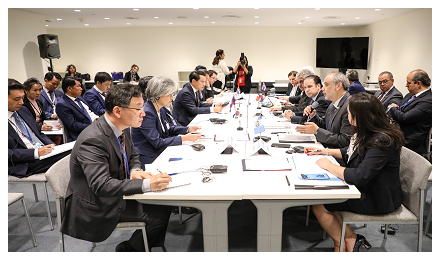
The FEALAC Troika meeting was suggested at the 7th FMM in 2015 with the aim of ensuring a greater continuity of FEALAC agenda and an effective implementation of National and Regional projects.
The Troika consists of two previous, current, and incoming Regional Coordinators and is held every year on the sideline of the United Nations General Assembly (UNGA) under the leadership of current Regional Coordinators.
The Troika consists of two previous, current, and incoming Regional Coordinators and is held every year on the sideline of the United Nations General Assembly (UNGA) under the leadership of current Regional Coordinators.
Senior Officials’ Meeting (SOM)
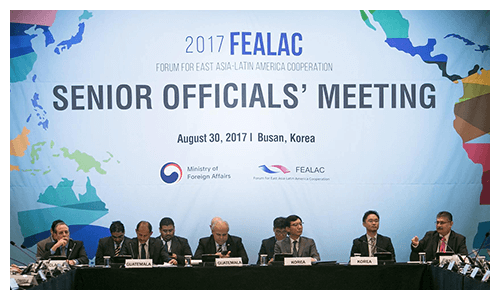
The SOM is annually attended by senior officials, oversees the Working Group Meetings, and makes decisions regarding FEALAC by adopting SOM final report.
It approves the discussions of Working Group meetings and other key meetings, reports them to the FMM, and selects other key topics to be discussed at the FMM. It is held at least once a year.
It approves the discussions of Working Group meetings and other key meetings, reports them to the FMM, and selects other key topics to be discussed at the FMM. It is held at least once a year.
Working Group Meeting (WG)
The Working Group coordinates and harmonizes existing national projects and explores potential synergies between national projects and Forum-wide projects. It is attended by delegates of working-level to elaborate detailed frameworks for cooperation between two regions. WG can also invite by consensus the private sector, the academia and other relevant non-governmental organizations as well as regional and international organizations, whenever appropriate.
At the 1st Foreign Ministers’ Meeting, the Ministers agreed on the establishment of three Working Groups* to sustain the momentum generated by the Meeting and to concretize the cooperation between the two regions.
* Politics, Culture WG, Economy, Society WG and Education, Science, Technology WG
At the 6th Foreign Ministers’ Meeting (June 2013, Indonesia), reorganization of the three Working Groups into the following four Working Groups was agreed for greater effectiveness and comprehensive discussion.
At the 9th Foreign Ministers’ Meeting (November 2019, Dominican Republic), renaming of the previous Socio-Political Cooperation, Sustainable Development Working Group was agreed so that it includes the Climate Change aspect of related projects, naming it Socio-Political Cooperation, Sustainable Development and Climate Change Working Group.
At the 1st Foreign Ministers’ Meeting, the Ministers agreed on the establishment of three Working Groups* to sustain the momentum generated by the Meeting and to concretize the cooperation between the two regions.
* Politics, Culture WG, Economy, Society WG and Education, Science, Technology WG
At the 6th Foreign Ministers’ Meeting (June 2013, Indonesia), reorganization of the three Working Groups into the following four Working Groups was agreed for greater effectiveness and comprehensive discussion.
At the 9th Foreign Ministers’ Meeting (November 2019, Dominican Republic), renaming of the previous Socio-Political Cooperation, Sustainable Development Working Group was agreed so that it includes the Climate Change aspect of related projects, naming it Socio-Political Cooperation, Sustainable Development and Climate Change Working Group.
Each Working Group is operated by Co-Chairs elected from each region. Working Group meetings are held more than once a year to discuss modifications and developments of projects and to report them to the Senior Officials’ Meeting.
Coordination Meeting (CM)
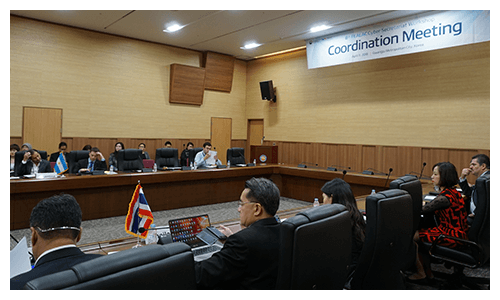
The Coordination Meeting was established based on the
「Guideline for FEALAC Working Process」which was adopted at the 7th FMM in 2015. The Coordination Meeting replaced the Core Group Meeting (2003~2006) and the Coordinating Board Meeting (2010~2014) in order to strengthen the role of the Regional Coordinators and improve communication among member countries.
The Coordination Meeting is consecutively held with the SOM and FMM, and carries out preliminary discussions on the agendas of the official meetings. Additional meetings are recommended between the SOMs for more coordination and consultations among the Coordinators and the Working Group co-Chairs.
It is composed of two Regional Coordinators, all WG Co-Chairs, the two immediately previous Regional Coordinators, incoming Coordinators (if possible), and the Cyber Secretariat.
The Coordination Meeting is consecutively held with the SOM and FMM, and carries out preliminary discussions on the agendas of the official meetings. Additional meetings are recommended between the SOMs for more coordination and consultations among the Coordinators and the Working Group co-Chairs.
It is composed of two Regional Coordinators, all WG Co-Chairs, the two immediately previous Regional Coordinators, incoming Coordinators (if possible), and the Cyber Secretariat.
FEALAC Multi-Donor Trust Fund
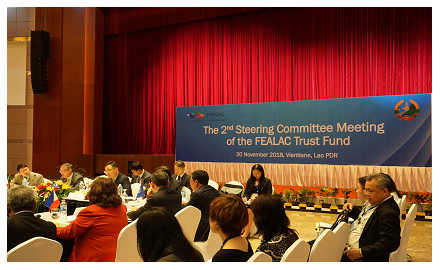
The FEALAC Multi-Donor Trust Fund was established the 8th FMM in 2017 under the partnership with the UN ECLAC and UN ESCAP. The Fund supports projects which are inter-regional in scope and the most effective in enhancing mutual understanding between East Asia and Latin America.
The Steering Committee acts as a central advisory body of the Fund, plays a critical role in indentifying priorities in projects and activities, and operates transparently in a way that ensures the best interests as a whole. The Steering Committee consists of the FEALAC Troika, donor countries, UN ESCAP and UN ECLAC, and observers.
The co-Chairs of the committee are selected from respective region, and the meeting is held at least once a year back to back with the FEALAC SOM.
The Steering Committee acts as a central advisory body of the Fund, plays a critical role in indentifying priorities in projects and activities, and operates transparently in a way that ensures the best interests as a whole. The Steering Committee consists of the FEALAC Troika, donor countries, UN ESCAP and UN ECLAC, and observers.
The co-Chairs of the committee are selected from respective region, and the meeting is held at least once a year back to back with the FEALAC SOM.
FEALAC Logo
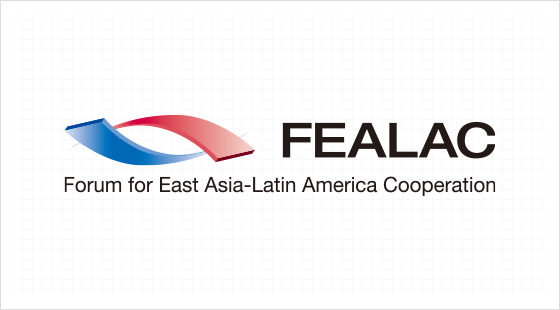
The approval of the use of FEALAC logo is vested in the consensus of the members, in accordance with the decision making principle of FEALAC Guideline for the use of FEALAC Logo in 2015.
The FEALAC logo can mainly be used to official meetings and related side events, FEALAC-wide or Bi-regional projects approved at FMM or SOM, and other national projects that have been reported at official FEALAC meetings.
For any other use including national projects that are unreported at official meetings or other cases closely related to FEALAC matters, the use of FEALAC logo shall be inquired to the Regional Coordinator of the respective region at least two months before the expected date of its use. The authorization shall be granted by the Regional Coordinator through the Cyber Secretariat.
The FEALAC logo can mainly be used to official meetings and related side events, FEALAC-wide or Bi-regional projects approved at FMM or SOM, and other national projects that have been reported at official FEALAC meetings.
For any other use including national projects that are unreported at official meetings or other cases closely related to FEALAC matters, the use of FEALAC logo shall be inquired to the Regional Coordinator of the respective region at least two months before the expected date of its use. The authorization shall be granted by the Regional Coordinator through the Cyber Secretariat.